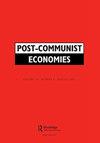一个转型故事并不适合所有人:共产主义后的初始地区条件和新的商业形成
IF 1.8
3区 经济学
Q2 ECONOMICS
引用次数: 5
摘要
摘要:我们调查了东德从中央计划经济体制向市场经济体制转变后,新企业形成的明显区域差异的原因。在共产主义时期结束时,那些拥有合格劳动力和相对较高比例的自营职业者的地区,创业率相对较高。这也适用于高科技制造业的初创企业。基于我们的结论,即政策应该考虑到这些最初的地区条件,我们使用共产主义时期末的地区知识基础和自营职业的衡量标准来引入地区分类。本文章由计算机程序翻译,如有差异,请以英文原文为准。
One transition story does not fit them all: initial regional conditions and new business formation after communism
ABSTRACT We investigate the reasons for the pronounced regional differences of new business formation after the transformation from a centrally planned system to a market economy in East Germany. Relatively high start-up rates are found in regions that had a well-qualified workforce and a relatively high share of self-employment left over at the end of the communist period. This also holds for high-tech manufacturing start-ups. Based on our conclusion that policy should account for these initial regional conditions, we use a measure of the regional knowledge base and self-employment at the end of the communist period to introduce a classification of regions.
求助全文
通过发布文献求助,成功后即可免费获取论文全文。
去求助
来源期刊

Post-Communist Economies
ECONOMICS-
CiteScore
4.90
自引率
18.20%
发文量
21
期刊介绍:
Post-Communist Economies publishes key research and policy articles in the analysis of post-communist economies. The basic transformation in the past two decades through stabilisation, liberalisation and privatisation has been completed in virtually all of the former communist countries, but despite the dramatic changes that have taken place, the post-communist economies still form a clearly identifiable group, distinguished by the impact of the years of communist rule. Post-communist economies still present distinctive problems that make them a particular focus of research.
 求助内容:
求助内容: 应助结果提醒方式:
应助结果提醒方式:


